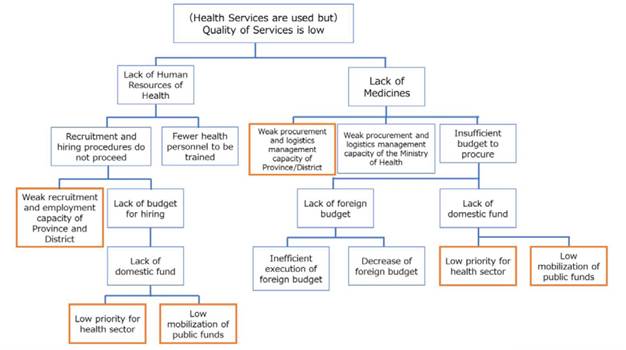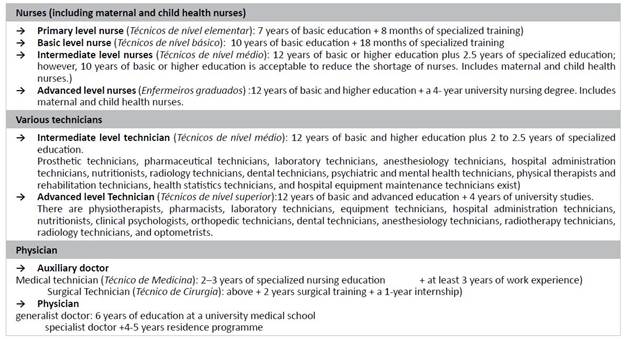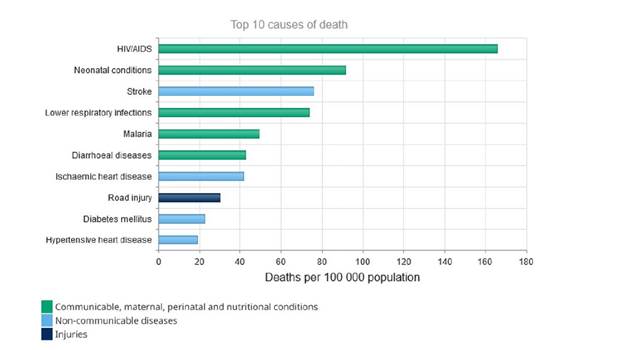Mozambique, with a population estimated around 32,500,000 (more than 60% living in rural áreas), still remains one of the poorest and least developed countries in the world. Poverty in the country is the result of a series of economical and social factors: low income, poor coverage of health services, lack of potable water and basic sanitation. The health sector is predominatly public and is organized into four levels of care:
1- A public subsystem, dependent on the Ministry of Health, the National Health Service (NHS), the largest provider of care. It employs over 90 per cent of health workers in Mozambique and includes four central hospitals, seven provincial hospitals, two psychiatric hospitals, fifty district hospitals and 1,585 health centres distributed throughout the country.
2- A private subsystem divided into
a) private for-profit, mostly concentrated in Maputo ;
b) private not-for-profit subsystem includes religious organisations and non-governmental organisations (NGOs), the majority foreign and directly funded by the cooperation partners (donors) and health facilities in some public and private companies and in educational establishments, such as the Eduardo Mondlane University.
3- A military and paramilitary health subsystem, still embryonic;
4- Socio-professional organisations such as the Medical Council, the Nursing Council, and the Medical Association of Mozambique, considered part of the National Health System.In a country with drastic inequalities between urban and rural areas and between regions (North, Centre, and South), with political instability during decades, financial constraints, lack of infrastrutures and technology and deficit of human resources, the NHS faces serious problems and still does not cover the entire territory or respond to the basic needs of all citizens (less than 50% of the population covered), and is struggling to embrace the evolution of medicine and public health, the pace of technology and innovation, or research and development (Figure 1).

Figure 1 Relationship between Challenges and factors in Mozambique Health Care. Source: Japan International Cooperation Agency. Data Collection Survey on the Health System in Mozambique Final Report. Available at: https://openjicareport.jica.go.jp/pdf/1000045945.pdf
Human resources and training
One of the major issues of Mozambique NHS is the shortage of qualified healthcare professionals and an uneven distribution in rural and peri urban areas (Table 1). Differences in educational content among training institutions and the lack of an established continuing education system represent a challenge in the quality of care.
Table 1 Health workers in Mozambique Workforce density for 100.000 population, January 2018, (95% CI)

Modified from : Fernandes et al Human Resources for Health, 2023
To train nurses, clinical technicians and specially doctors is an extended and lasting process (Table 2) and demands a long term strategy planning. For a doctor to qualify as a specialist, after medical school (6 years), mandatory internship and residency, it can take up to 11 years. It should be noted that there is not lack of interest in post graduate education by the young doctors who are very much interested in pursuing their career and in the development of their capabilities.
Table 2 Training duration for health worker main cadres in Mozambiquee health system

Source: Prepared by Survey team based on the data from Mid-level health workers for delivery of essential health services, Annex 6. Mozambique (Global Health Workforce Alliance, WHO, 2013)
The need of improvement of the quality of the health working force is expressed in the National Development Strategy 2015-2035 (Estratégia National Development 2015-2035), a long-term development plan, and the Mozambique Health Sector Strategic Plan 2014-2019 (PESS, Plano Estratégico do Sector de Saúde). The former aims to improve the living standards of the people by implementing four main strategies: (1) human capital development, (2) infrastructure development, (3) research, innovation and technology development, and (4) organization, coordination and institutional articulation.
Disease Structure
In the last decades the proportion of deaths due to infectious diseases decreased comparing to non communicable diseases (NCD) in the African region. At the present time, in Mozambique, cardiovascular diseases (CVD) are the leading cause of morbidity and mortality of NCD ( isquemic heart disease, rheumatic heart disease-RHD, stroke). The prevalence of RHD is estimated at 3.04%, (Figure 2 and Table 3)

Figure 2 Top 10 causes of death in Mozambique (2019). Source: Global Health Estimates 2020: Deaths by Cause, Age, Sex, by Country and by Region, 2000-2019. Geneva, World Health Organization; 2020.
Recognizing:
the importance of medical education of the health care professionals in the field of cardiovascular diseases (CVD) and of improving skills in clinical evaluation, eletrocardiography and echocardiography in the adult and pediatric population
the burden of rheumatic heart (RHD) disease, a preventable CVD, affecting 39 million people worldwide, mostly children and young adults, attaining in Mozambique one of the highest rates in sub-Saharan Africa among school-age children, the Portuguese Society of Cardiology (PSC) and the University Eduardo Mondlane (UEM) developed the programme Heart with Mozambique 2023. This project coordinated by Professor Victor Gil and Professor Ana Olga Mocumbi (UEM), had also roots in the programme of the World Health Federation “Colours to Save Hearts” .
The main scope of this programme is to train healtcare professionals:
in the clinical assessment and managementárea of CVD, interpretation of ECG and performance of echocardiography
in the performance and interpretation of echocardiography in children to detect abnormal cardiac anatomy and RHD (clinical and subclinical).
The implementation of this programme included:
The constitution of a Task Force, under the coordination of Professor Victor Gil, integrating an Organizing Committee (Isabel Monteiro, Kevin Domingues, Fernando Montenegro Sá, Mariana Lemos) and medical volunteers (cardiologists and pediatric cardiologists).
A survey to the health professionals in Mozambique to identify their educational and training needs in the field of CVD in order to improve their clinical practice.
Online course “Cardiovascular Diseases: diagnosis and management”, with nine sessions, covering scientific subjects selected by the mozambican health professionals. The course had clear learning objectives, a strong interactive and practical component, including echoardiographic screening. The Portuguese scientific programme team had the contribution of Cláudio Guerreiro, Luís Morais, Ana Esteves, Ana Neto, Inês Almeida Marisa Passos Silva, Sara Fernandes, Isabel Graça, Miguel Mata, Kevin Domingues, Isabel Monteiro, Helder Santos and Mariana Lemos. The course had a total of 64 attendees - doctors (General Practice, Gynecology-Obstetrics, Cardiology, Internal Medicine), nurses and senior technicians.
Mission in Mozambique: The PSC organized a Mission in Maputo with a team of eight cardiologists and three pediatric cardiologists: Victor Gil, Cláudio Guerreiro, Luís Morais, Ana Esteves, Ana Neto, Inês Almeida, Marisa Passos Silva, Sara Fernandes, Catarina Brandão Mariana Lemos e Sílvia Alvares. Additionally acquired ten portable and handheld ultrasound devices to perform echocardiography.
The mission occurred from the 1st to the 15th of July 2023 with two major activities:
Education in CVD: practical daily courses with clinical cases to develop clinical assessment, diagnosis and management of the principal CVD at the UEM Clinic
Clinical activity and screening for CVD in three locations:
Maputo Central Hospital, Matxiqui-Txiqui Primary School and UEM Clinic.
a) Maputo Central Hospital
Screening for RHD was carried out in pregnant and postpartum women in the Obstetrics I, II and VI wards of the Maputo Central Hospital; 213 women were screened and a total of 279 echocardiograms were performed, with 42 echocardiograms (19.7%) reported as abnormal.
b) Community/School: Matxiqui-Txiqui Primary School
Screening for RHD was carried out in children aged between 5 and 15 years : 1853 children were screened and 1787 echocardiograms were performed, with 279 (15.6%) reported as abnormal. These cases were referred to local clinics for follow up.
c) UEM Clinic
Twenty four 24 Health Professionals were trained in transthoracic echocardiography and 219 patients were screened with subsequent management guidance.
The “Heart with Mozambique” project was sponsored by His Excellency the President of the Portuguese Republic and has the support of the Secretary of State for Foreign Affairs, the Portuguese Ministry of Health and the Camões, I.P.(Camões instituto da Cooperação e Língua). The acquisition by the Portuguese Society of Cardiology of the ten portable and handheld ultrasound devices proved to be essential to carry out the project; these were later donated to UEM where they will be used in future editions of the program, as well as in activities and places in need in the country.
This first Mission represented the launching of a desirable and regular In country health programme to provide medical training and capacity building in the area of CVD in Mozambique. With future editions of the project, the team hopes to consolidate the training already provided but also extend it to other professionals who did not have the opportunity to participate in the first edition. The trainees can subsequently train other health providers, enabling expansion of skills and knowledge. We achieved in 2023 a partnership with Mozambican health professionals that extended beyond the mission trip and allowed the establishment of telemedicine network and interaction to improve continuous professional education and the quality of services delivered. Major challenge is fundraising. Fortunately the relevance of this project was recognized by Camões, I.P.(Camões instituto da Cooperação e Língua), providing financial support for a three years’ programme. Additionally, the effective commitment of the PSC and the UEM in this project, aiming at capacity building and training of health professionals and improvement of health care in CVD, its sustainability can be assured and we plan to assess its benefits and results in the future programs.
Conclusion
Mozambique has the cooperation of a large number of international organizations in the field of health care and provision of care. The major objective of Heart with Mozambique is the training and development of the local health care professionals in the diagnosis and management of CVD, improving their skills in echocardiography. The close relationship that was achieved among the portuguese and mozambican health professionals motivates us to continue these missions. Because, as Nelson Mandela said ” Education is the most powerful weapon you can use to change the world”.
Acknowledgments
All Portuguese participants were supported by their home institutions to participate in the project, after a "public interest” recommendation by the Health Minister.
A special thank for the continuous support and encouragement to the Secretary of State of Foreign Affairs and Cooperation Dr Francisco André and The President of Republic, Professor Marcelo Rebelo de Sousa.
We thank other organizations that provided financial or in-kind contributions for this project: Apifarma, Mello Saúde, Luz Saúde.
We thank António Saagua and Catarina Lobo (SPC) that provided the administrative support for the project.
















